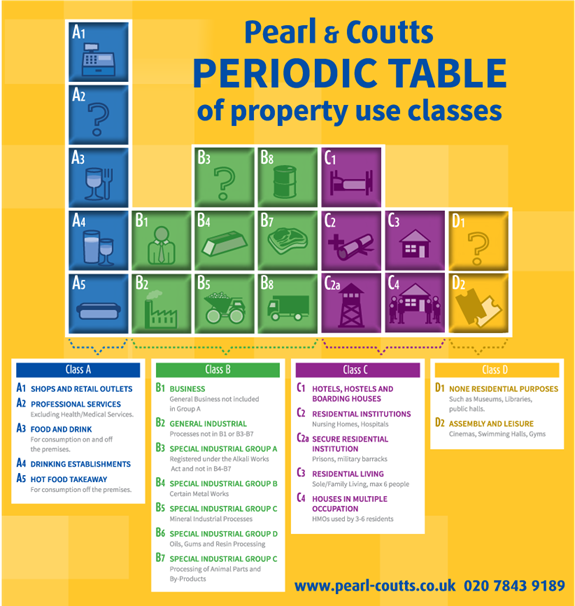
These classifications exist because most UK properties have their nature of use defined by the local authority. For example, a property with A1 usage can be used for hairdressing, the selling of products or various other retail uses. The purpose of these classifications is to ensure that local authority plans for the area are realised, helping with town planning and local development. For example, if an area is having problems with a lack of parking spaces, they can reduce the number of offices in the area, to which too many people are driving to and parking. Another example could be the reduction of B5 usage properties (industrial) which could be disturbing local residents through fumes and noise.
Class A
A1 – Shops and Retail Outlets. For example:
- Retail sales of goods.
- Hairdressing.
- Key cutting.
- Sale of cold food and snacks.
- Ticket sales.
- Travel Agency.
- The reception of goods to be cleaned or repaired.
- Post Office.
A2 – Professional Services. For example:
- Financial Services.
- Professional Services (excluding medical or health based services)
- Any other services where it is provided in an area of shopping, where said services are provided to members of the public.
A3 – Food and Drink
- The sale of hot food and drink for consumption on or off the premises.
A4 – Drinking Establishments
- Use as a Public House, Wine Bar or other drinking establishment.
A5 – Hot Food Takeaway
- Use for the sale of hot food consumption off the premises
Class B
B1 – Business
- An office not in use within the B2 category (i.e. financial or professional).
- Development or research of processes or products.
- Any industrial process, excluding practices which would result in an increase of noise, smell, pollution and other harmful or disturbing emissions.
B2 – General Industrial
- Property used for an industrial process not outlined in the B1 category or within B3-B7.
B3 – Special industrial Group A
- Property used for any work that can be registered under the Alkali Works Regulation Act 1906, and also not used in categories B4 to B7.
B4 – Special industrial Group B
Used for any of the examples below, except when the process is assisting the procurement or treatment of minerals and is carried out in a nearby quarry or mine. Processes can include and are not limited to:
- Smelting of minerals.
- Converting or reheating metals or alloys.
- Galvanizing.
- Metal recovery from scrap materials.
- Chromium Plating.
B5 – Special industrial Group C
Used for any of the examples below, except when the process is assisting the procurement or treatment of minerals and is carried out in a nearby quarry or mine. Processes can include and are not limited to:
- Burning of pipes or bricks.
- Producing Cement or Alumina.
- Crushing, screening or heating of minerals or slag.
B6 – Special Industrial Group D – processes can include and are not limited to:
- Distilling or refining or oils (excluding petroleum).
- Rubber production from scrap.
- Manufacture or acetylene from calcium carbide.
B7 – Special Industrial Group D – Processes can include and are not limited to:
- Manufacturing from animal parts.
- Drying of animal skins.
- Curing of fish.
- Other such processes involving animal by-products.
B8
- Storage or distribution centres.
Class C
C1
- Hotels and Hostels, boarding houses and guest houses.
C2
- Residential institutions such as nursing homes or hospitals.
C3
- Properties intended for the use of residential living whereby individuals, families or not more than six people are living together as a single household.
Class D
D1 - Any use not for residential purposes such as:
- Provision of medical or health care.
- Museums.
- Library.
- Public or exhibition hall.
D2 – Assembly and leisure:
- Concert halls or cinemas
- Bingo halls.
- Swimming pools and gyms.
- Other recreation not involving motor vehicles.
These classes have been adapted and simplified from part of the UK Statutory Instrument 1987 No. 764, The Town and Country Planning (Use Classes) Order 1987 as found here:
http://www.opsi.gov.uk/si/si1987/Uksi_19870764_en_2.htm
For more information on property classifications, commercial or residential property, please contact us on 020 7843 3788.


